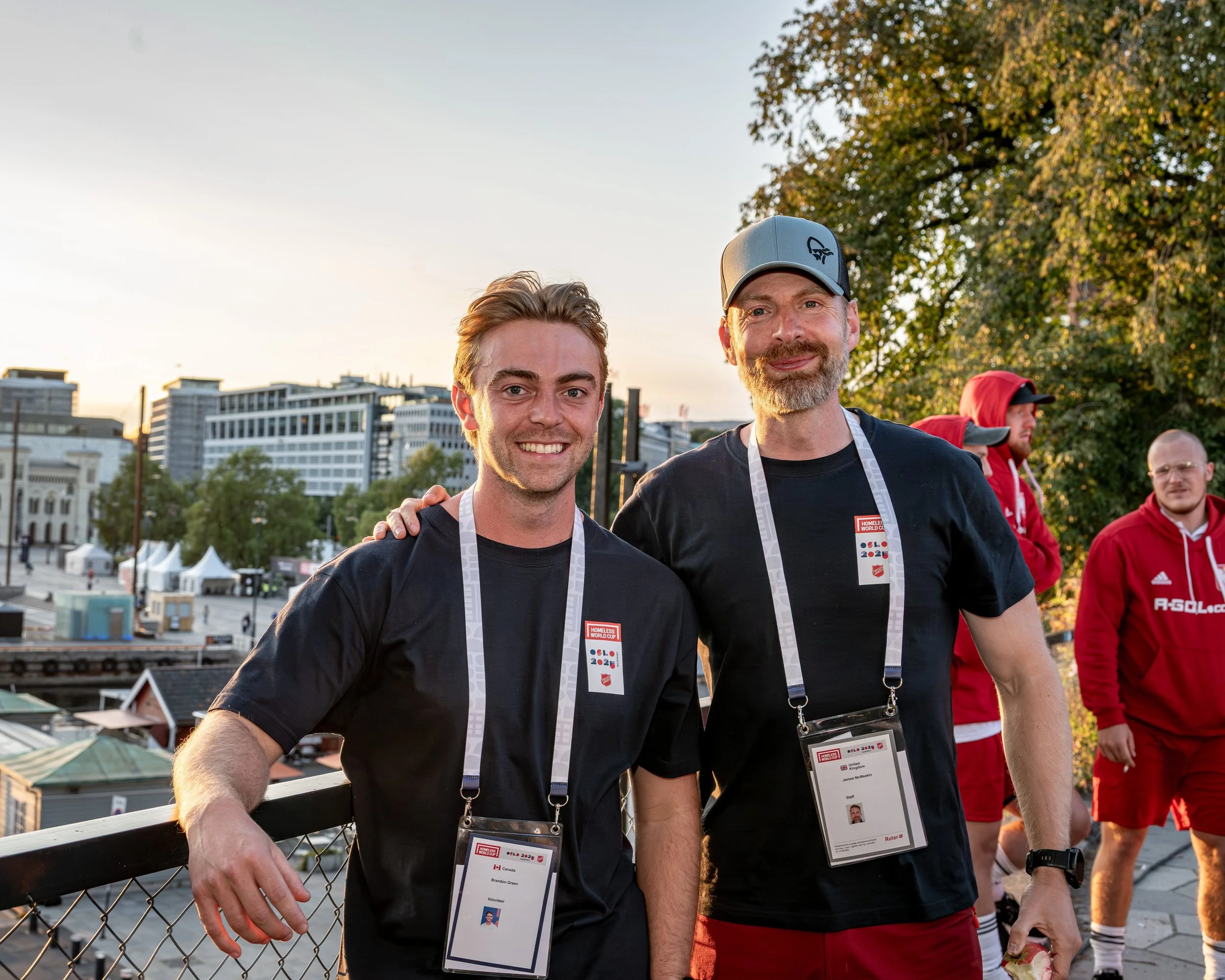The definition of success
Brandon at the Oslo 2025 Homeless World Cup - his second tournament and most likely not his last
When Canadian Brandon Green initially came to his first Homeless World Cup to complete self-directed study for his university degree, little did he know his involvement and experience would become much more. In no surprise to the other volunteers or anyone else who has had the privilege of encountering the tournament up close, in 2025 Brandon is in Oslo and attending a Homeless World Cup a second time—likely, the second of many, as Brandon has not only immersed himself in the tournament, but extended his contributions and capacity to help facilitate sport for social change.
Those contributions and capacity have taken a number of forms that have seen him traversing the globe for approximately three uninterrupted months. For in the time intervening the 2024 and 2025 events, Brandon has completed an internship where he was involved in the organisation and implementation of the African Women’s Cup and Pan-African Summit for Gender Violence and Mental Health, using football as a tool to address gender-based violence across Africa.
He additionally supported the Homeless World Cup in the lead-up to, and now throughout the delivery of, the 2025 event in Oslo, Norway. Alongside both, Brandon supported the relaunch of the Canadian Street Soccer Association that will see a Canadian team return to the Homeless World Cup after an absence of more than a decade, and he has been invited to participate in the United Nations Youth Conference that will be held later in 2025, reflecting his ongoing commitment to leveraging sport for social impact.
Initially having attended the 2024 tournament as a way to put theory and passion into practice around sport-for-social change research, Brandon first came across the Homeless World Cup while conducting initial investigations for his research project on sport for development and peace. He was seeking a case study focused on using sport as tool for positive impact on a national and international scale. The Homeless World Cup, which annually uses football to tackle homelessness through the participation of some 500 players from 48 nations, comprehensively fit that bill.
Friends reunited: Brandon worked closely with VAP - our Member Country in Kenya.
“I kind of stumbled across the Homeless World Cup,”
Brand with Homeless World Cup Chief Operating Office James McMeekin
Brandon explains. “My professor, Brianna Waldman, had been and volunteered at the Homeless World Cup before in Sacramento [where it was hosted in 2023]. We began exploring opportunities for me to attend, volunteer, and support the Homeless World Cup in Seoul, South Korea, which aligned perfectly with the founding of the Canadian Street Soccer Association.” In some ways, it was two birds, one stone.
Brandon had not been involved in football before attending the 2024 tournament in Seoul—he had a background as a high-performance player in baseball—but had long been exploring solutions to the complexities of poverty and homelessness in the Pacific Northwest, where he had been actively involved in numerous local initiatives.
“For a long time, I would avoid people sleeping on the streets, feeling anxious and judgmental as I walked by. I realised that my fear was unfounded, and I had never experienced harm, yet I had never truly engaged with them. I decided to start acknowledging and connecting with people in my community, simply saying hello as I passed. To my surprise, these small interactions were met with warmth and mutual respect. In this I felt the true importance in human connection.”
Brandon’s research initially concentrated on how different countries define homelessness and what their goal of success is. It has, as any good research does, shifted over the course of his study as he learnt more. Brandon says he could write a dozen more papers based on what he’s learnt in the last year, with spin-off topics turning over in his mind daily.
“Different countries define and address homelessness in varied ways, reflecting their unique social, cultural, and economic contexts. For example, in my home country, Canada, homelessness is often shaped by the complex interplay of addiction and systemic factors, highlighting how deeply social challenges influence who experiences homelessness.”
While his theory-meets-practice research is ongoing, Brandon has developed the following achievable learnings so far. Fascinatingly, they in many ways reflect his initial foray into engaging with people in his hometown who were sleeping rough.
“First, we must create a society where kindness is commonplace, and the notion of ‘random acts of kindness’ becomes unnecessary because kindness is simply the norm,” he says.
“Before positive impact can be made the core of any solution must be based in kindness and love.” This is something that became particularly apparent to Brandon through his work in temporary settlements/slums in Kenya as part of his work using football as a tool to address gender-based violence. “Second, a simple hello and the often lost art of small talk can go a long way, especially when offered to someone who rarely receives it.” Both elements are fundamentally at play at the extremely inclusive Homeless World Cup itself.
Beyond the 2025 tournament, which is about to kick off, Brandon intends to continue with the work he’s laid the foundations for over the past few years. For a start, he hopes to remain actively involved with the Homeless World Cup and to continue to contributing to the growth and initiatives of the newly re-established Canadian Street Soccer Association. He plans to continue pursuing his academic career, extending his research and portfolio and its local and global impact. In the interim, though, he has a week-long football tournament to help deliver, with its attendant kindness meets high-octane football energy.



